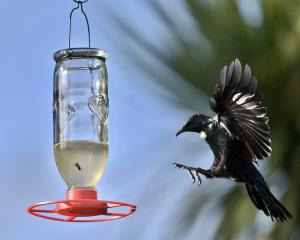The North Island thrush — piopio — and the huia are described by Mr A. J. Rutherford, Alfredtown, Wellington province, as the most charming songsters of the old Forty Miles Bush. When he first heard the thrush’s rich, contralto, bell-like notes, he was taking pack-horses along a muddy bush track to get a load. Leaving the horses to feed he wandered off to see what bird was uttering the best notes of the forest. He found a pair of thrushes at the bottom of a gully, with park-like tree ferns and giant timber, and every time he passed that place, he paid them a visit in their beautiful home. They nested in trees, out of his reach, close to a small stream. They were very tame. If he kept very still, and imitated their notes, they came down and had a good look at him, hopping about like robins in search of worms, and giving exhibitions of their vocalisation. Up on the range, and all about, he could hear the huias’ cheerful notes. Learning to imitate them, he called down all huias within sound on to the trees. Years afterwards at Porirua, a verandah with a tree in it was wire-netted, and six huias were kept there for about a year. They were young birds that had been snared by Maoris. They became charmingly tame. In the morning, at times they woke the household with long-drawn out whistling notes. They flew down on to the children’s shoulders to be fed. A Maori chief at the pa brought supplies of huhu grubs and rotten timber, which the male chiselled with his sharp, straight, bill, to enable the female, with her curved bill to pick out the grubs. Sometimes one of them threw grubs in the air for the other to catch. When supplies of grubs were short, pieces of raw mutton were offered and accepted. The following spring, they began to pine, and three of them died, and the remaining three were taken by the children up on to the top of the range and liberated in the forest. Mr Rutherford concludes:—‘‘Lovely feathered pets, doomed to destruction by our so-called civilisation! Peace to their ashes! Boys and girls, study Nature first hand. It is useful and fascinating. If you do so, you will learn to help to preserve the remnants of the beautiful bird life in these islands, your adopted country, once part of a mighty continent, now outposts in the great Pacific Ocean.’’
In peril on the sea
It seldom happens in New Zealand that a coastal sea fisherman finds himself faced with that greatest of all dangers, fire, but such was the experience of Mr Charles Sproule, of Moeraki, a few days ago. He had been out in his boat (the Seabreeze) all night, fishing, and while returning home in the early hours of the morning found his vessel to be ablaze, and he was almost immediately hurled out of the cabin by a violent explosion. The boat was soon burning fiercely from end to end, and the boatman, after a hard fight with the flames, succeeded in hoisting the sail in the hope that the wind would carry the vessel towards the shore. The wind was unfavourable, however, and the flames continually licked Mr Sproule’s face and arms, but, in spite of this, he managed to reach the rocks under the Moeraki lighthouse, but barely in time, for no sooner had he touched land than the vessel turned over and sank. The occupant was completely exhausted when the lightkeeper and his staff came to his aid. He was later taken to Palmerston for medical treatment. It is supposed that the vessel’s petrol tank had begun to leak, and the petrol, running into the body of the boat, had ignited from a back-fire from the engine. The boat and her contents are a total loss. — ODT, 21.10.1923














